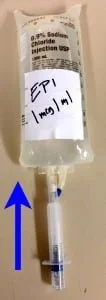
My Peripheral Brain
*
My Peripheral Brain *
"I consider that a man's brain originally is like a little empty attic, and you have to stock it with such furniture as you choose. A fool takes in all the lumber of every sort that he comes across, so that the knowledge which might be useful to him gets crowded out, or at best is jumbled up with a lot of other things, so that he has a difficulty in laying his hands upon it. Now the skillful workman is very careful indeed as to what he takes into his brain-attic. He will have nothing but the tools which may help him in doing his work, but of these he has a large assortment, and all in the most perfect order. It is a mistake to think that that little room has elastic walls and can distend to any extent. Depend upon it there comes a time when for every addition of knowledge you forget something that you knew before. It is of the highest importance, therefore, not to have useless facts elbowing out the useful ones."
~Sherlock Holmes
Anaphylaxis
Having treated anaphylaxis hundreds, if not thousands of times, it is not essential to place this diagnosis and treatment in my peripheral brain for “off-site storage,” but I found myself wondering why autoinjectors, such as the Epipen, contained “standard” doses of 0.3 and 0.15 mg for adults and children.
Of course, weight-based dosing is the gold standard, with the recommended dose of 0.01 mg/kg to a maximum 0.5 mg in adults, 0.3 mg in children, typically administered IM in the thigh. So why the discrepancy, evil Epipen makers?
Well, it all goes back to the 1987 FDA approval at the 0.3 and 0.15 dosing, and everyone else following suit. The "Official" shift to the 0.5 mg IM max has been a slow-burn evolution:
2008-2011: Europe and the UK (RCUK) basically said, "Math is math," and officially moved their adult recommendation to 0.5 mg.
2020-2023: The World Allergy Organization and US Practice Parameters finally caught up, explicitly stating that 0.5 mg is the preferred adult dose, especially in the ER where we have the luxury of a syringe and a vial.
The Bottom Line:
So, why the discrepancy? Because we are practicing 2026 medicine with 1980s hardware.
While the auto-injector in your patient's purse is still likely a 0.3 mg "legacy" dose, when they hit your ER doors and you're reaching for the crash cart: Think 0.5. It’s not just a "high dose"—it’s actually the right dose.
In the ER, the following medications are also typically given:
H1 and H2 antihistamines (like diphenhydramine 50 mg and famotidine 20 mg IV) for symptomatic relief of urticaria and pruritus.
Bronchodilators (albuterol) for respiratory symptoms
Intravenous fluids (1-2 liters of normal saline) for hypotension
Corticosteroids, though evidence for preventing biphasic reactions is limited (methylprednisolone 1-2 mg/kg IV to a maximum of 125 mg in adults and 50- 100 mg in children often used)
Now, we get to the real reason for a peripheral brain post - The Dirty Epi drip.
If the patient still needs epinephrine (multiple IM doses needed); then, you need an epinephrine drip. Recommendations include IV epinephrine started at 1-4mcg/min and titrated from there. Unfortunately, an epi drip can be similarly difficult to obtain from pharmacy. A trick of the trade can be found at ALiEM here to make a "dirty epi drip."
Get 1mg of epinephrine (from code cart).
Inject this 1mg of epi into 1,000 mL normal saline bag which = concentration of 1 mcg/mL.
Run wide open until symptom response and/or patient stabilizes.
Wide open administration of a “dirty” epinephrine drip results through 18G IV cathaeter is about 20-30 mcg/min when administered wide open. This can be titrated down when the symptoms improve. 1ml per min (60ml/hr) would be a 1mcg per min recommended starting dose.



